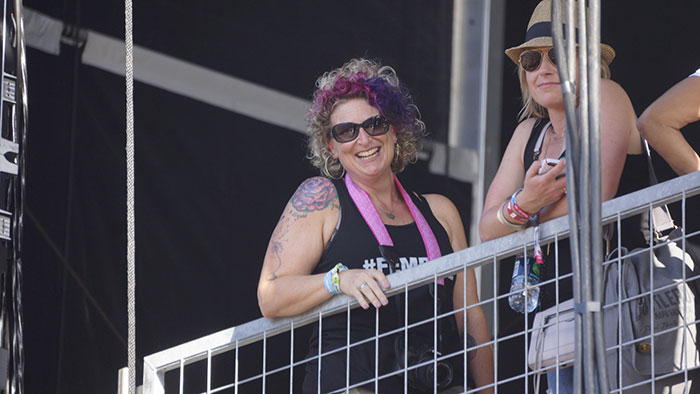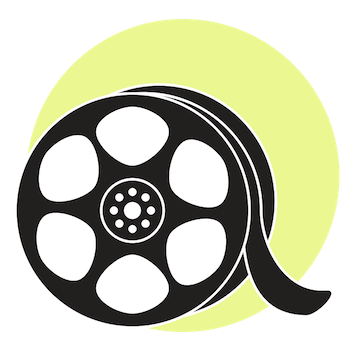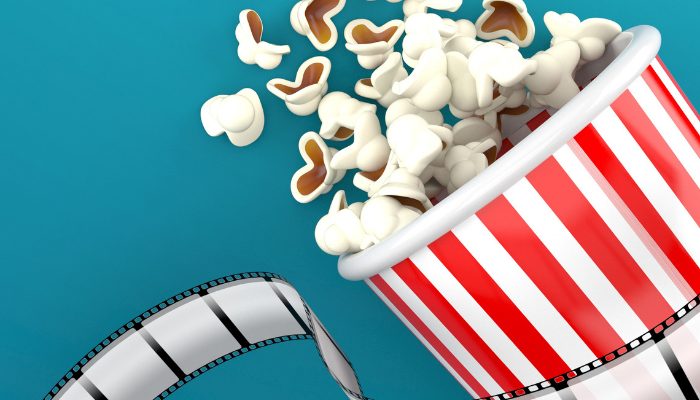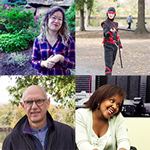Faces Behind the Screen: Cat Brewer (Sign the Show)
Quick Links
<< Return to all “Faces Behind the Screen” stories
When Cat Brewer saw a sign language interpreter for the first time at a concert over five years ago, her passion for equal access to entertainment was born. Not long after that, she embarked on her journey as the executive producer and director of Sign the Show, a documentary which highlights the lack of equal access to entertainment for people who are deaf and hard of hearing.
“Entertainment brings so much joy to people’s lives.”
After speaking with people in the Deaf community, Cat learned that deaf and hard of hearing people face many barriers and challenges when trying to access live entertainment. She has since dedicated herself to creating Sign the Show in the hopes that it will raise awareness and bring positive change to the entertainment industry.
We had the privilege of interviewing Cat for Faces Behind the Screen. In her interview, she brings to light some of the issues of accessibility in entertainment and what we can do to help improve equal access. She also tells us all about Sign the Show, which she hopes to submit to film festivals later this year.
In Cat’s words, “It’s going to take a whole community. It’s going to take everyone. It’s going to take hearing people to advocate. It’s going to take deaf people to continue advocating. Because I did not start this fight on my own. I’m just doing one little piece in a way that I know how.”
Visit SignTheShow.com to support or learn more about the documentary, and be sure to follow Cat’s Facebook and Twitter account for Sign the Show updates.
Part One
In part one of Cat’s interview, she tells us the inspiration behind the documentary, Sign the Show, and describes what access to entertainment is like for people who are deaf or hard of hearing.
We’d like to get to know you a little more. What’s your background?
CAT BREWER: I have been a teacher for the last 20 years. I teach communications courses at the community college level, mostly public speaking and interpersonal communication. I’ve done a lot of PR and marketing for some jazz musicians from the Bay Area, but that almost seems like a lifetime ago. And more recently, in the last five years, I started producing this documentary called Sign the Show.
What got you on this path of wanting to create a documentary and start producing and directing?
CAT BREWER: I actually never had any desire to be in entertainment. I have no knowledge or background in film whatsoever. But about five and a half years ago, I attended a concert. And for the very first time, I saw a sign language interpreter [at the concert]. I’ve been going to concerts since I was eight years old…and I was both ignorant and amazed at what I saw.
I really didn’t have much involvement in the deaf community at all. I knew a couple of deaf people, but they were peripherally in my life…I didn’t realize that deaf people could enjoy music or that they liked to go to concerts, and that’s where my ignorance came in. So I started chatting with the interpreter and then communicating with the deaf people that were there at the concert through the interpreter because I don’t sign. I didn’t back then, and I don’t sign as well as I would like to now.
Through that conversation, I learned that…deaf people do love music, that they do want to attend concerts, but that they face a lot of challenges or access to barriers when trying to go to see live entertainment…I think it just clicked in my head, like, hey, I have taken my hearing privilege for granted my entire life.
Can you describe what access to entertainment is like for people who are deaf or hard of hearing, and why did that spark your desire to make Sign the Show?
CAT BREWER: If I want to go see a concert or a comedy show, I basically just go online or go purchase a ticket somewhere and go. I don’t have to jump through hoops or come up against barriers or challenges to be able to do so. And so I started thinking, like, well, that’s not fair because entertainment brings so much joy to people’s lives, whether it’s music or comedy.
And I was like, OK, well, what can I do to help make this more accessible?
I started talking to more people, and then I got an idea to write an article for the school newspaper. Like I said, I’m a teacher. And then a friend of mine who works at a big newspaper in the Bay Area was like, hey, I think this is a great idea. We’ll publish an article for you.
I started talking to another friend, and he was like, oh, you should make a documentary. And again, I have no background in this whatsoever, so I took a one-day intensive course in filmmaking at a film school in San Francisco. And I spent probably three hours in Best Buy drilling the employee there about, like, what kind of camera should I get? I’m a teacher, so I was on a budget. And I ended up buying a camera, and then I hit the ground running.
I started approaching deaf people and sign language interpreters and comedians and musicians and theater actors to try to create a story for film to tell the story of the challenges that the deaf and hard of hearing community face when trying to access live entertainment.
What has life been like for you while making Sign the Show?
CAT BREWER: Yeah. Within [the past] five years, I’ve had major life changes. I uprooted my life and moved to Las Vegas. And then I’ve still been teaching and trying to have a little bit of a life. But I had no idea [the documentary] would, one, take this long, and two, cost so much. But…I wouldn’t have traded this experience for the world. I’ve met some of the most amazing people…I met Matt Maxey, and I consider him one of my dear friends. And I met interpreters [like] Holly Maniatty, who I also consider a really close friend.
Part Two

In part two of Cat Brewer’s interview, she talks about some of the barriers and challenges that people who are deaf or hard of hearing face when trying to access live entertainment. For example, even when people request an interpreter for a concert or comedy show the venue never responds.
Read on to learn more about these barriers and to discover how Sign the Show can help change artists and live entertainers perspective on accessibility in the entertainment industry.
Can you tell us about a personal experience where you saw barriers to accessing live entertainment?
CAT BREWER: I have been very fortunate to be able to bridge some of these communities. Matt [Maxey] and I went to a comedy show here in Vegas…it was the first time that he’s ever been to a live comedy show, and I was able to introduce him to a comedian named DL Hughley. And DL is also in my film and was gracious enough to say, hey, yeah, come on backstage. Let’s meet.
There was access there for Matt through an interpreter. It wasn’t necessarily the best access, and that was by no means the fault of the interpreter but more so the onus of the venue and not having proper placement of the interpreter or proper lighting for the interpreter. So these are all some of the challenges that I’m trying to bring awareness to and hopefully try to make it better.
What are some of the challenges that deaf or hard of hearing people face when they’re trying to access entertainment?
CAT BREWER: My focus has really been on live entertainment. The little bit that I can speak to, like movies, is I know that not every theater provides movies with captions. And if they do provide movies with captions, it’s often sometimes maybe not a first-run movie or it’s at specific times. So again, that plays into someone who’s hearing wanting to go to a concert– and I’ll relate the two to a live concert, music or comedy– and we take for granted that we can go online, buy our ticket, and go to any show we want.
For a deaf or hard of hearing individual, if they want to do that– and there have been many– in the five years that I’ve been doing this film, there have been many instances of this happening that I have been made aware of or that I’ve been involved in to try to get access.
As a deaf and hard of hearing person, if you want to go to a show, you have to request an interpreter. And by law, through the Americans with Disabilities Act, an interpreter is provided free of charge for any live event.
Even with that law in place, there’s still a lot of barriers…
But even with that law in place, there’s still a lot of barriers to it. So there have been many instances when a deaf or hard of hearing person will request an interpreter, and maybe the venue never gets back to them. And so why would you want to spend your hard-earned money on a ticket when you don’t know if you can get access because you won’t be able to fully enjoy the entire event?
If they do make contact with a venue and they say, hey, I want to go to a concert that’s happening on Saturday night– and let’s just say that whoever the performer is, they’re doing a three-night run– Friday, Saturday, Sunday. And the deaf individual requests… to go on Saturday night. The venue…could say, “Oh, sorry, we’re only providing an interpreter on Sunday night.” Well, what if the deaf person can only attend the event on Saturday? What if they work on Sunday? So as opposed to [the venue] just going, “OK, we’re providing access Friday, Saturday, and Sunday. Of course, you can come. You’re welcome. We’re providing access. We’re inclusive.” That is not the standard.
Do any of the artists you’ve spoken to agree that access to entertainment is important and that it needs to be pushed to the forefront?
CAT BREWER: I would say that a lot of artists maybe weren’t even aware of [access to entertainment] Again, if you don’t have someone in your life that is deaf or hard of hearing, who’s never had to struggle to get access to these things, you’re not aware of it. I’m not a comedian or an artist or a musician, and I wasn’t aware of this until I saw and talked to people who are facing these challenges.
Sometimes in an interview, you can see the light bulb go off, like, oh, yeah, you’re right, this is a big deal. Some people get it. Some people don’t. Whether they’re artists or not. And so I’m hoping that through the release of the film…that maybe more artists [will] be on board [with access] and say, hey, I’m performing at this club. You have to provide an interpreter.
Part 3
In the final part of Cat Brewer’s interview, she speaks about what entertainers and venues can do to improve access to entertainment and how she hopes that Sign the Show will make an impact.
How do you hope that Sign the Show will make an impact?
CAT BREWER: That’s a big what if, a big question for me. Is my film going to be able to make an impact? It’s my hope and my intention to, but it’s not just something that I can change.
It’s going to take a whole community. It’s going to take everyone. It’s going to take hearing people to advocate. It’s going to take deaf people to continue advocating. Because I did not start this fight on my own. I’m just doing one little piece in a way that I know how. But there have been people long before me who have been fighting for access.
People can check out the film on social media…any updates will be provided there.
I don’t in any way want to seem like I’m the first person doing this. I’m just approaching it, I think, in a different way. There have definitely been artists who have recognized the importance of this and have made attempts to have interpreters at their shows. But again, it’s more of a long-term, sustainable solution that we’re looking for.
Do you have anything else to add about the film?
People can check out the film on social media…any updates will be provided there. The website is SignTheShow.com…I need to update it, and it will be updated when the film comes out, or right before the film comes out.
Like I said, I’m a teacher, and so my funds have been…pinched in a lot of ways. I spent my entire life savings on this film, doing it myself. I have a GoFundMe account that, if people are so inclined to donate, that would be much appreciated because there’s still a lot left to do with editing and licensing of music and licensing of footage.
Do you have a list of actionable items that these venues or entertainers can do?
CAT BREWER: There definitely are action items for people to take. First and foremost, if you are a supporter of the deaf and hard of hearing community and you have friends that are deaf and hard of hearing that want to go to a concert or to live entertainment, to be proactive.
I’m advocating for open access for people who want it and who request it.
Assist if you are asked for assistance. And sometimes, that’s even a challenge. Like I’ve been asked a few times to help with my deaf friends to get access to events, and it doesn’t always happen.
Or like I mentioned, the access will be provided, but it’s not ideal, like the proper placement of the interpreter or proper lighting on the interpreter. So I think education and making people aware of the fact that the deaf and hard of hearing community want access and want to be included, but…have been excluded for so long, that sometimes that struggle feels really challenging to take on themselves.
I’m advocating for open access for people who want it and who request it. And then eventually, hopefully, it will just be provided and there won’t be hoops to jump through to get it.
Faces Behind the Screen is a storytelling project focusing on members of the Deaf and hard of hearing community.







